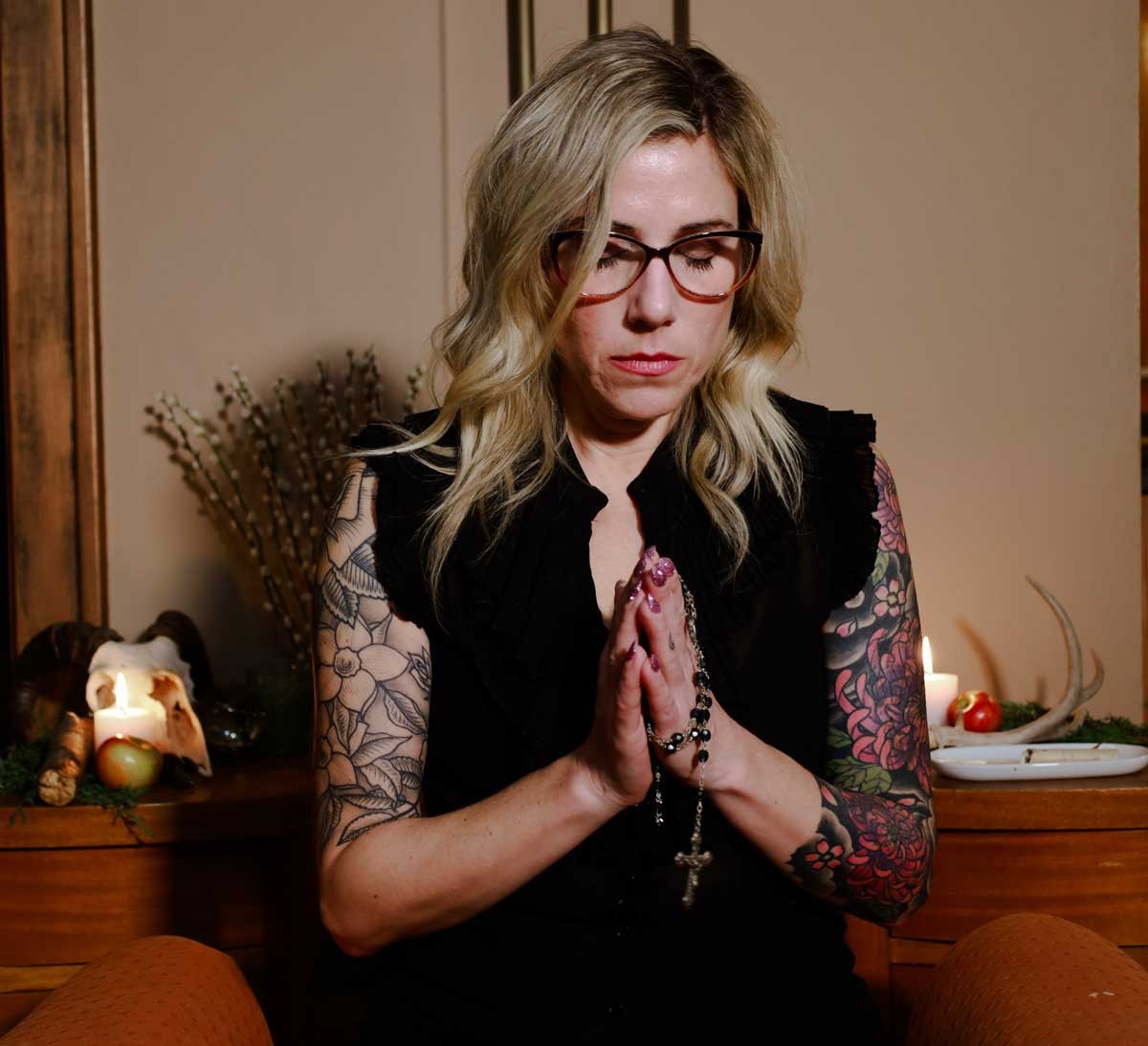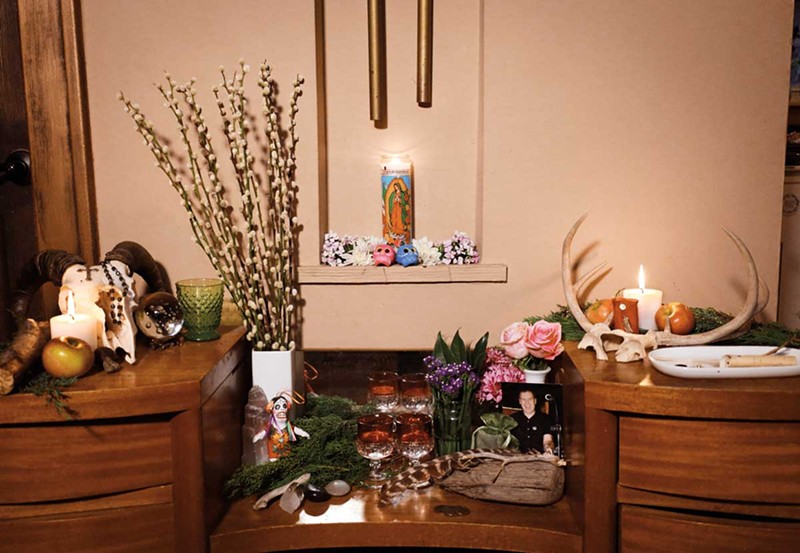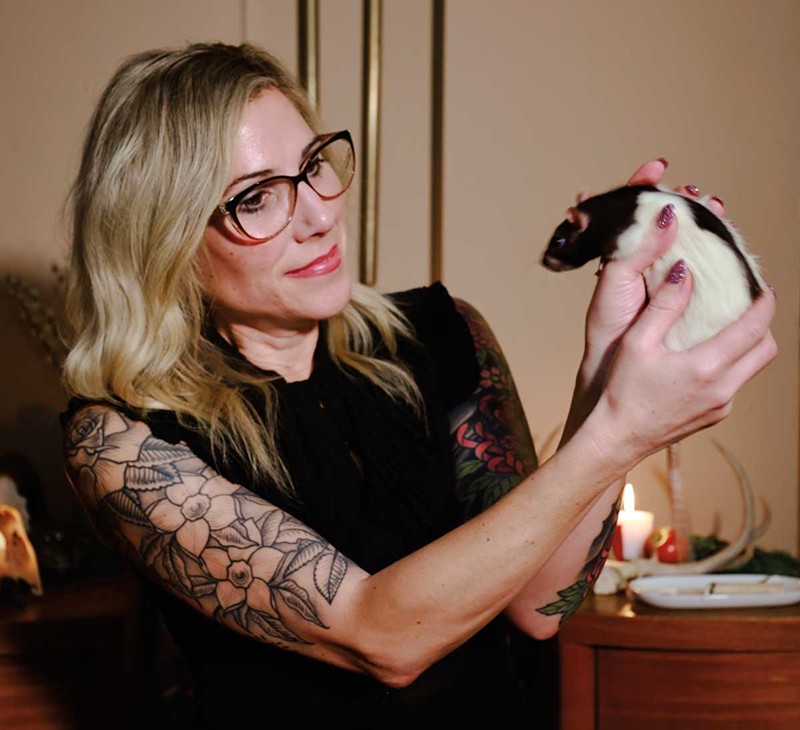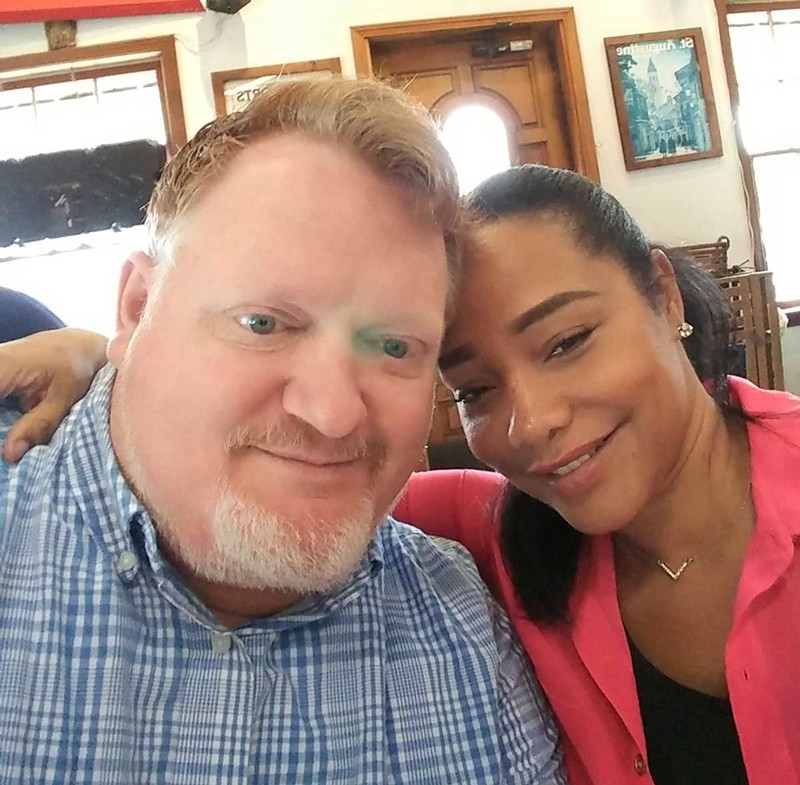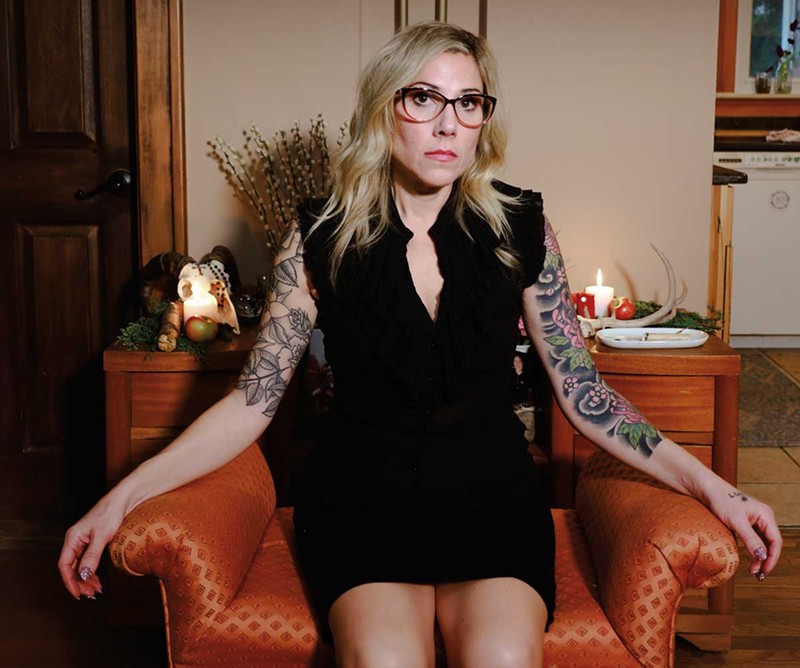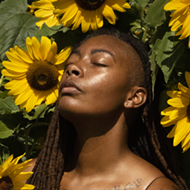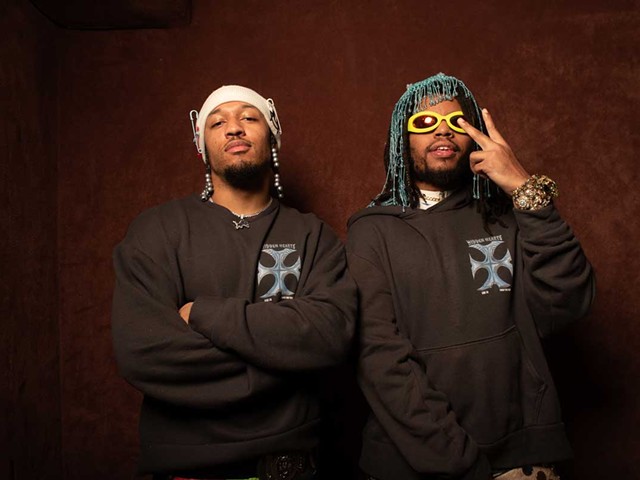As I lie on a pallet of blankets, I begin to notice the subtleties of being alive. My breath enters and escapes my body as a repeat visitor. My heartbeat gives my chest a steady hug and the blood flowing through my veins is an unending stream of consciousness.
My bones weigh heavily into the ground and it feels like I’m sinking into a grave. Just as soon as the sensations heighten, the death doula sitting at my side whispers, “One day this will all stop. You will die. I will die. Everyone you know will die.”
Her words jolt my spirit out of my body to hover above my belly. A bright light shines at the crown of my head as my memories play and then fade. I laugh, cry, have sex that sends sparks of electricity through my fingertips, and jump into my mother’s arms, squeezing her with a child’s unconditional love. My mother… I’m not ready to say goodbye to her yet. But my spirit is already separating from this physical body reluctantly like a piece of gum being peeled off the bottom of a sneaker.
I become dirt. The mycelium coiled underneath the soil becomes me. As I return to the endless void of space where all time and possibilities exist, everything goes dark.
Is this what it feels like to die? Maybe. But I am obviously not dead. I’m being led through a death meditation by metro Detroit-based death doula KristySue Bishop. In this guided meditation, Bishop helps you visualize your death, your spirit lifting out of your body, and the body decaying.
Talking about death used to be taboo, but the death doula profession saw a rise in popularity during the COVID-19 pandemic when humanity was faced with its mortality on a grand scale; in that time an organization called the National End-of-Life Doula Alliance grew to more than 1,000 members in 2021, up from 200 in 2019. Death doulas are also sometimes called end-of-life doulas, and the terms are used interchangeably. To help us face the ever-present notion of death, these doulas offer a range of services to the living, dying, and loved ones of the recently deceased.
While this can mean sitting bedside with the terminally ill and seeing them through their transition, it can also look like making funeral arrangements or cleaning out the deceased person’s house to ease the burden on their family members. Some death doulas bring joy into the dying’s last stretch of life with therapeutic exercises like painting or breathwork.
Bishop’s work, however, focuses more on the living. Her goal is to normalize talking about death and encourage people to use their grief to examine their lives so that when they do eventually die, they’ll (hopefully) be fulfilled.
“I think the biggest misconception is that we’re only here for the dying,” she explains to me over tea in Ferndale. Her bubbly laugh, bright blonde hair, and chrysanthemum tattoos seem to juxtapose the morbid subject of our conversation, which she approaches no holds barred.
She sips from her latte and the steam fogs her glasses as she continues, “We’re also here for the living that are preparing to die, which everybody is preparing to die... We have this misconception that death is when you’re older but you really have to think about these things like, what’s going to happen if I get in a car crash? What are the things that I want? If I can’t speak, who’s gonna do that for me?”
Later, at the death meditation, in a dimly lit room with trays of crystals and candles scattered in corners, she tells me, “Grief is the space between death and desire.”
I reorient myself to the physical space as I come back into my body — feeling my clothes resting on my skin, seeing the light peaking through the blinds, smelling the waft of incense in the air. Following the meditation, Bishop gives me journal prompts like, “What are the things in your life that need to die away?” and, “What do you desire to have in your life?”
She holds frequent “death talks” and meditations like the one I’ve just experienced in the Congregation, a former Detroit church-turned-coffee house, and virtually.
She describes it as “bringing awareness [of death] into life really hardcore,” an accurate descriptor as the air in the room changes from awe at the miracle of life to a deep nothingness when she says “Everyone you know will die.”
“It sounds scary and horrible, but it’s really grounding,” she says. “I mean, it depends on where you are with grief. If you just had somebody die, I would say not to do it. But if you’re OK with your grief it’s a good exercise for keeping your life where you want to be. The more that we think about death, it gets us back on track.”
Processing grief
Most of us were never taught to process our grief in a healthy way. And there is often an uncomfortable silence around death and the fact that we all experience it.
Death consumed Bishop’s life when her ex-husband Pat Shaw was diagnosed with terminal cancer nearly five years ago and she became his caretaker. Shaw, a local musician and former Third Man Records employee, would die eight months later in November 2018. He and Bishop had two children.
“I had many people die in my life, but this was somebody that was supposed to be in my life every day,” she remembers. “Life looked different to me after. Everything completely changed, and so many things fell away that I thought I cared about so much… It was like 1,000 different egos of myself had died away, like his death also caused my own little death.”
Bishop’s curious pet rats greet me when I enter her home for a follow-up. She explains that her husband had promised to get their children pet rats just before he died, so she kept his promise.
Being confronted with death forced Bishop to evaluate whether she was going to be brave enough to live the life that she wanted — a more meaningful and purposeful one. But as she grieved, she realized a lack of resources for processing those emotions. She decided to become a death doula to help people through the grieving process, filling the silence surrounding death with support instead.
“We’re not educated enough on the process of dying and all the things that happen. And I mean, not even just the physical aspects, but the logistics of it all,” she says. “There’s the cleaning up of the house and so many things that we just don’t think of that need to get done. And it’s put on the people that have gone through these huge emotions. It’s just so hard for people, the stress of that struggle while you’re going through losing somebody.”
“Living well is dying well. When we get to our deathbed what do we want to bring with us? What do we want to sit there with? What do I want to be thinking about my life?”
tweet this
She continues after a pause, “I just didn’t want to get lost in the silence, I guess. I was talking to my therapist and I said, ‘I think this is what I want to do now. I want to help people that are going to be in my situation.’ She goes, ‘Oh so you want to be a death doula?’ And I was like, huh? A what?”
Bishop would go on to receive her death doula certification through the Ann Arbor-based Lifespan Doulas program in 2020. She is also trained in reiki, restorative yoga, reflexology, grief mentoring, and mediumship — all things she says helped her through her grieving process.
A large part of Bishop’s work involves simply being there to talk — and more importantly, listen — to people who are grieving.
“It might be harder for them to talk to a family member, or the family members might not be able to be there for that conversation,” she says.
She also uses methods like having her clients talk into a cup of water and then offer the water to a plant or a tree.
“You’re getting it out, using your voice, first of all, which we don’t use enough,” she says. “Trees give us oxygen, right? So we’re already in communication with them. [It’s] this living back and forth. So it’s like, why can’t we do that with our grief also? We can just give our grief to the trees and they process it.”
She also recommends journaling and dissecting grief without judgment when the weight of it all becomes too much.
“There’s so much involved in grief that it can become one big ball, and it feels so big that we just get stuck,” she says. “So we break it down like, what am I actually grieving right now? Because there’s the big loss and we have all these little secondary losses too. Am I grieving being a solo parent right now? Or am I grieving loss of control? Being able to write about just that one thing, breaking it down, so you can process it and going back and visiting the others later, it just helps it feel a little less complex.”
The good death experience
Charon Collier was used to taking care of the elderly as a hospice volunteer in 2013. Her new client Sheri, however, was a frail woman in her thirties lying in a hospital bed in the middle of her living room. The image of a woman the same age as her dying of liver failure shook Collier to her bones.
Collier is a Detroit native and death doula who splits her time between Michigan and Jacksonville, Florida. She worked as a hospice volunteer for nearly 10 years before becoming a death doula, and Sheri was one of the cases that inspired her eventual career path.
Much like Sheri, Collier was a single mother with young children at the time.
“I’m watching her at the end of her life, and I’m watching these kids and the turmoil it’s causing in their lives,” she remembers vividly. “They were getting called home from school every day but I think they were acting up because they wanted to be home with their mom. She’s not able to get up and play with them anymore… so I’m watching this and I’m like, this could easily be me but by the grace of God, it’s not.”
Sheri’s liver failure was caused by a lifelong struggle with alcoholism. Even though she was dying, she wanted to try and get clean in hopes of getting a liver transplant, so she asked Collier to take her to Alcoholics Anonymous meetings.
“Even though she’s in hospice and I’m her volunteer, I’m not going to tell her it’s too late,” Collier says. “I’m gonna take her to those meetings. So I did. I drove her and I sat in meetings with her.”
Collier took Sheri to AA meetings every Saturday, but wasn’t able to one weekend due to a trip she had planned well before the two met. Sherri was disappointed, but Collier promised to take her as soon as she returned on Monday. Collier felt a little guilty but told herself Sheri would be there when she got back. She knew in her heart, however, that wasn’t true.
“I just dismissed it [and] went on my trip,” Collier recalls. “I came back Monday morning and first thing I did when I woke up Monday, I called and asked to speak to her and they told me she had passed away. I was crushed. That was the first time I think I cried doing the work. I had some guilt too… I beat myself up for a long time and I had to work through that.”
As a hospice volunteer, her assignment was considered complete once the client died, so Collier wasn’t able to check on Sheri’s children. This bothered her and was the first time she thought of becoming a death doula, even though she didn’t know the proper term for it.
“That follow-up with the family and the kids, it would have been nice to be on the other side of that for as long as they needed me,” she says. “If that had been a situation where I was an independent death doula, I could have gone back and checked on the family to see if they needed anything for the next six to 12 months.”
That was back in 2013, before death doulas became popular. At the time Collier was doing administrative healthcare work during the week and volunteering in hospice after hours and on weekends. She found herself caught between doing what she loved, which was caring for the dying, and the job that paid her bills.
Fast forward to 2020, when the COVID-19 pandemic hit and the idea of death doulas came into mainstream culture, and Collier realized what the work she wanted to do all along was called.
“No one was talking about death doulas back then but after the pandemic, courses started popping up,” she says. She became a certified death doula in 2021.
Unlike Bishop, who uses death to inspire people to live, Collier helps her clients have a “good death experience.” The Good Death Experience is the name of her business where she offers death doula certification, coaching, and mentorship to teach other doulas how to run a profitable business. It’s also the title of her upcoming book The Good Death Experience: Journey from Hospice Volunteer to Death Doula, due out in the spring. Collier also offers death doula classes through the Ascension School of Healing Arts in Ferndale both virtually and in person.
In The Good Death Experience, Collier tells the story of 10 patients who taught her significant lessons on her journey, including Sheri. Each patient gets their own chapter.
While Collier was studying to become a death doula, her close friend Hans was battling cancer. He had been in home hospice under his mother’s care for some time, but his condition worsened and he had to be hospitalized, almost as if by fate, right when Collier finished the doula course.
Hans’s mother called Collier asking her to be at his side to usher him into the afterlife. He was Collier’s first client as an official death doula, and his story is the first chapter in The Good Death Experience, which is dedicated to him.
“He had cancer in his jaw area and the wound had started to bleed out aggressively that morning that she called,” Collier remembers. “The next day was my birthday and I drove up to South Carolina to be with him… I spent three days [doing] what we call ‘vigil,’ when you sit bedside with someone as they’re transitioning. Me, his mom, his best friend, and his aunt, we all sat with him and talked. I held his hand.”
She continues, “We always say people pick and choose when they leave… It’s funny because that night, his mom was like, ‘Should we stay longer?’ We knew it was getting close. And I said, ‘I don’t know if he’s gonna pass when we’re still here.’ Some people want family around and sometimes they just want to be alone. I do believe that we have that much control over when we pass.”
Collier went to see Hans on her birthday, September 4, and he passed away on September 7, after she and his family left the hospital.
“I believe I was always a death doula in my heart anyway but to actually be able to independently work, not being assigned by a hospice volunteer organization, and have my first experience be one of my dearest friends on my birthday, I always say that was a gift,” she says. “Me being a death doula to him was a gift and him choosing to leave at the time he did, it was a gift to each other.”
It’s not the only time she says she’s experienced souls choosing the exact moment to move on. While she believes Hans wanted to be alone in death, she’s seen other clients whose family members waited to see them one last time before passing over.
Back when Collier was still a hospice volunteer, she once had to rush to get a woman named Mary to the hospital to see her dying husband. Collier remembers Mary being afraid that her husband would die before she could make it. Collier told her, “No, he’s gonna wait for you. Trust me.”
“It took me about an hour. I left school, drove to the opposite side of town, and took her to him because they had called and said he was starting to decline really fast,” she recalls. “He ain’t gone wait too long, so I said, ‘I’m just gonna pull up, Imma drop you at the door. Then I’ll park and come find you. You know that clipboard you sign [at the front desk]? Don’t even stop there. You go straight to him.’”
When Collier finally parked and met Mary inside the hospital, she was standing at the back of her husband’s room, scared to get close.
“So I just kind of nudged her and said, ‘Let him know you’re here. Let him know you’re OK.’ She did and he passed within three minutes of us getting there. I told her, ‘See, he waited for you,’” she said.
In her mentorship and business classes, Collier encourages death doulas in training to take the profession beyond bedside vigil and use their unique skills to help grieving families. For example, one of her students is a videographer, so she suggested they record the family during her time with them for a legacy project.
“The great thing about the space is you can be as creative as you want,” she says. “We all have great ideas but how do we monetize them or how do we make them pay the bills so we can eventually quit our ‘real job’ and do what we love while offering this service? … You’ve got to deal with the relatives and you’ve got to know what type of support they need. You’re not just supporting the person dying.”
For Bishop, this is probably more important than offering services to people who are actively dying. However, she says the idea of a “good death experience” is more fantasy than reality, which is why she prefers to focus on the living who are preparing for eventual death.
“When you ask someone how they want to die, of course, everybody has the same story. They want it to be like Cinderella, out in the wilderness with their family around them. And what is the [likelihood] of that happening? Slim to none,” she says. “Or people ask what would you do if you found out that you were going to die in a year. That’s more about life than it is death because if you’re going to die in a year you’re probably gonna be on medication, in the hospital, in a lot of pain, and trying to stay alive.”
She continues, “We should be in a truce with death. You have to live with it. … What’s a good death? For me, a good death is living well. Living well is dying well. When we get to our deathbed what do we want to bring with us? What do we want to sit there with? What do I want to be thinking about my life?”
For those who find it hard to cope with loss, or the thought of our own mortality, Bishop offers solace in knowing that death is only a transformation. It is not an ending, as energy never truly dies, she says.
“The thing that helped me the most in getting through his death was realizing he is actually still here,” she says about her ex-husband. “And then understanding that there is this collective, this energy that we all share, and keeping that communication open… you’re rebuilding your relationship with that loss. I feel like I’ve gone through so many different relationships with him. This is just another.”
Subscribe to Metro Times newsletters.
Follow us: Google News | NewsBreak | Reddit | Instagram | Facebook | Twitter

